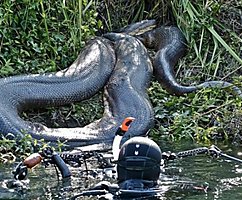NASA: From asteroid will save us only prayer
 Bashny.Net
Bashny.Net

The head of NASA admitted that mankind is unable to counter the threat from space.
If an asteroid discovered late fall to Earth only a miracle can save us / shutterstock.com
Humanity is not a technology that can deflect flying to Earth asteroid large, confident NASA. If, before the asteroid is three weeks, the head of department advises just pray.
The head of NASA, Charles Bolden answered questions from the Scientific Committee of the US House of Representatives. Congressmen interested in how much money to the agency unable to effectively protect the Earth from asteroid strikes.
The reason for the hearing began several encounters with the Earth large objects reported by the media for the first two months of 2013. Politicians worried falling meteorite Chelyabinsk February 15, 2013 g, and the span of a larger celestial body below the orbit communication satellites, which occurred on the same day.
"Two such important astronomical events that occurred on the same day, proving that we live in an active solar system - said Eddie Johnson, a Democratic congressman from Texas. - Dangerous objects fly past the planet with amazing frequency ».
"We were fortunate that the events of the last few months were simply an interesting coincidence rather than a catastrophe" - shared his opinion Chairman of the Committee on Science Lamar Smith, a Republican from Texas. Congressman added that the committee be interesting to know that NASA is doing to protect the United States and the world as a whole from falling asteroids, and how much money do I need to do it effectively.
According to the advisor of US President John Holdren Science, speaking in Congress to do away with our civilization may object diameter of 1 kilometer. At the same time, he noted that found only 10% of the 10,000 objects with a diameter of more than 50 m, which may threaten the planet. According to statistics, the asteroids of this size fall to Earth about once every 1,000 years.
Tags
See also
Can a giant umbrella to save us from global warming?
How fast and safe can be space flight for humans?
10 mistakes of the space program NASA
Study: NASA still can not afford a trip to Mars, but deserves funding for this program
Earth from Space: 15 amazing things for 15 years
Cosmic catastrophes may be even catastrophic
NASA experiencing an acute shortage of plutonium-238 power supplies SC
Myths about NASA
10 Incredible Technologies, which exploded in 2014.
15 years of the first contact with the vehicle earth asteroid
















